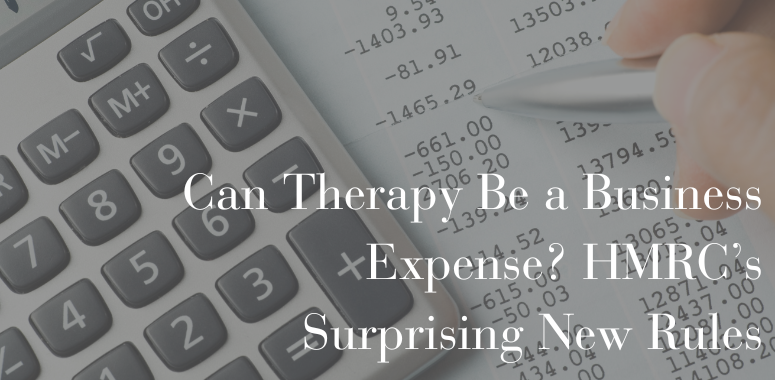
Ever find running a business so stressful you’ve thought about getting therapy? It turns out HMRC has just made this a whole lot more interesting for small business owners. Therapy can now, in certain circumstances, be treated as a business expense in the UK.
HMRC has released new guidance that allows counselling and therapy for employees to be classed as a tax-deductible expense. It’s unusual to see HMRC being generous, especially with something that clearly benefits people personally as well as professionally. But, as always, there are rules you’ll need to understand before you book that first session.
Can Therapy Really Be a Business Expense?
On the surface, this is a big win for mental health and workplace wellbeing. The change means employers can invest in therapy and counselling support for staff, knowing it won’t be penalised as a taxable benefit.
However, this isn’t a free-for-all. The HMRC counselling expenses exemption only applies if the person receiving therapy is classed as an employee. That means:
- Sole traders cannot claim therapy as a business expense.
- Directors who aren’t on the company payroll are also excluded.
- For companies with multiple employees, the benefit has to be available to everyone – you can’t just set it up for yourself and ignore your team.
So if you’re a limited company director who’s on payroll, there’s good news. If you’re a sole trader, unfortunately, this isn’t an allowable expense for you.
What Types of Counselling Are Covered by HMRC?
The rules get interesting when you look at what therapy is considered allowable. HMRC has set out a list of areas where counselling and therapy can qualify as a tax-deductible business expense.
Allowable Therapy Sessions
You can claim for therapy and counselling relating to:
- Stress
- Problems at work
- Debt problems
- Alcohol and drug dependency
- Career concerns
- Bereavement
- Equal opportunities
- Ill-health
- Sexual abuse
- Harassment and bullying
- Conduct and discipline
- Personal relationship difficulties
This is a surprisingly broad list. Many of these issues are directly linked to workplace wellbeing, but HMRC has gone further, recognising that personal struggles affect professional performance.
What HMRC Excludes
Not everything counts. The following are specifically excluded:
- Financial advice (other than debt counselling)
- Tax advice
- Leisure or recreational therapy
- Legal advice
The rules even get oddly specific. For example, if you see a therapist for gambling addiction, that’s covered. If you then happen to talk about the financial consequences of gambling, that’s still allowable. But if you booked sessions purely for financial planning, that wouldn’t be.
What About Group or Family Counselling?
Another interesting twist is that group therapy or family counselling can be allowable, provided the employee is always present and the sessions are structured as group work. Non-employees, such as partners or family members, cannot have separate sessions paid for under this exemption.
It’s clear HMRC wants to allow support for issues that impact employees’ ability to function at work, while avoiding opening the door to general lifestyle coaching or unrelated advice.
Why This Matters for Small Business Owners
For small business owners, especially those employing staff, this exemption could be a real opportunity. Offering mental health support as a tax-deductible expense makes it easier to invest in employee wellbeing. It also sends a strong message to your team that their health and happiness matter.
From a director’s perspective, this could mean accessing therapy through your business in a way that is both compliant and cost-effective. But remember, it only applies if you’re on payroll and the same benefit is offered to everyone else in the company.
This move also reflects the wider shift in how workplaces are expected to support mental health. Stress, burnout, and work-life balance are big issues. HMRC making therapy an allowable expense is one of the rare times tax rules line up with common sense.
Final Thoughts
It’s rare for HMRC to offer guidance that feels genuinely helpful. But this change could encourage more businesses to invest in therapy for employees, knowing it’s a tax-efficient expense.
For business owners, it’s worth checking how this fits into your company’s wellbeing strategy. Supporting mental health isn’t just good for staff, it’s good for business. And now, with HMRC’s backing, it could also be good for your tax bill.
If you’re unsure how this might apply to you, or whether your company setup makes you eligible, get in touch before making claims. The rules may be generous, but they’re still rules.
Frequently Asked Questions
Is therapy tax deductible in the UK?
Yes, but only under certain conditions. HMRC allows therapy to be a business expense if you’re an employee and the counselling relates to approved issues like stress, bereavement, or workplace problems.
Can directors claim therapy as a business expense?
Yes, but only if they are on the company payroll. Sole traders and directors who aren’t classed as employees cannot claim therapy costs.
Does therapy have to be available to all staff?
Yes. If you run a business with multiple employees, the therapy benefit must be available to everyone and not just management.
What types of therapy are excluded?
You cannot claim for legal advice, tax advice, or general lifestyle/recreational therapy.

